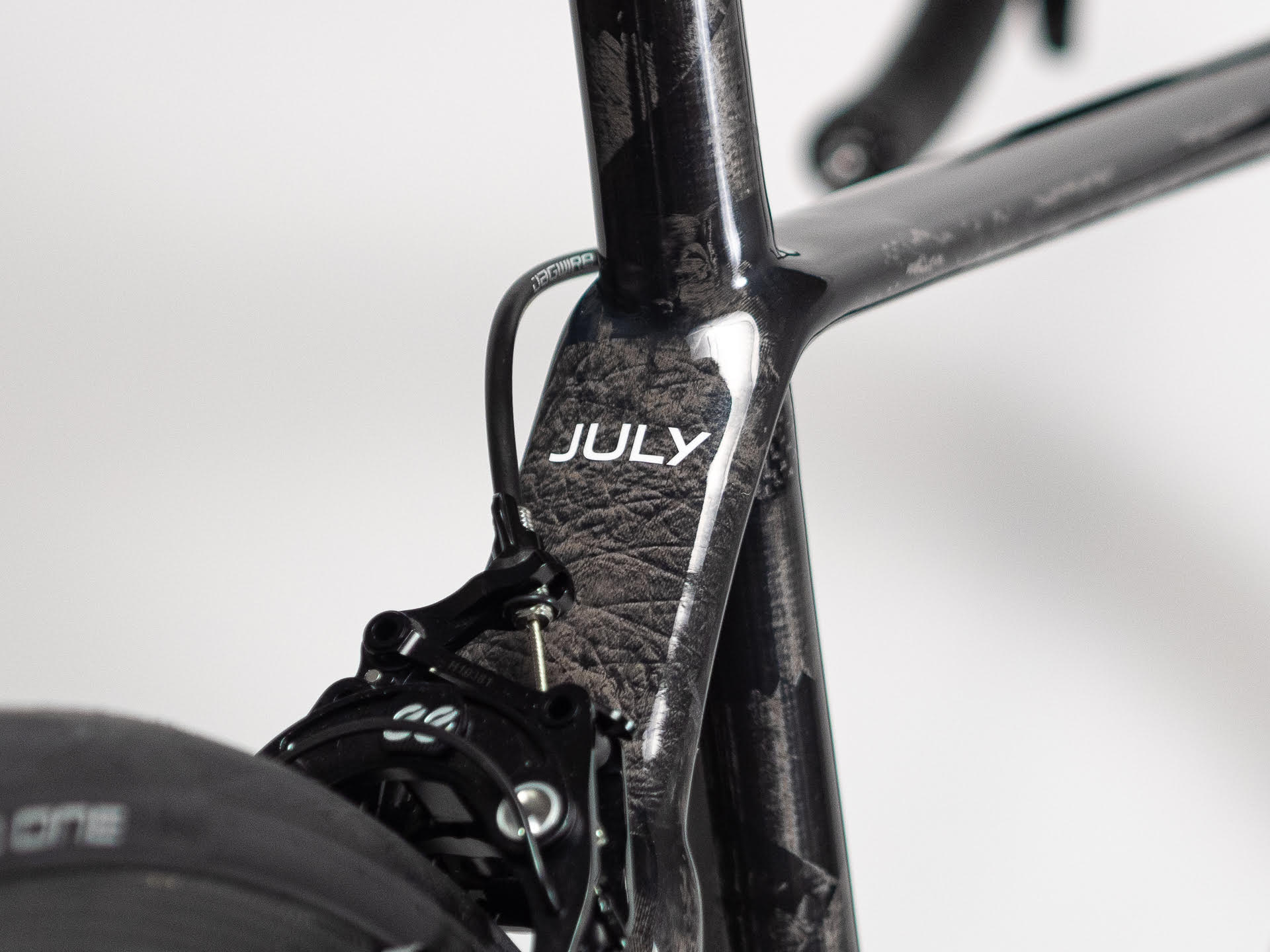Interview: Chris Merrill of Henry James Bicycles
Handmade custom bicycle manufacturing in the USA is facing its biggest crisis since TIG welding got popular. Henry James Bicycles is taking most of the heat. Company president, Chris Merrill, goes straight down the line.

CM: Back when they started, it was my father and mother-in-law that got them off the ground and pioneered that brand. There's been a lot of hours spent building it. It's hard to see that it's coming to an end, but we don't give up easily.
PS: What was the original link between Hank and True Temper?
CM: True Temper has always built steel tubing and golf shafts, that's by far the biggest part of the business. When they decided back in the early 80s to get into the bicycle business they needed guidance on what product to come out with, and to distribute it to the framebuilding world. That's where Hank and the people at True Temper came together. They knew of him through the investment cast lugs, that side of the business. From the start, Hank was very instrumental in the devlopment of the product. Not only his knowledge of the cycling industry, but also as a metallurgist, his experience and training were a big help to them. Much of the line was designed with Hank's input.
PS: Is it fair to say Hank is largely responsible for the wide range of tubing specifications?
CM: Yes, back in the early days of True Temper they had a good engineering crew there, they would definitely lean on Hank and they'd use what they could produce. There were some limitations on what they were able to produce, but it's pretty fair to say Hank's input let to all the specifications getting nailed down.
PS: What are your priorities now? You said in your statement that the first thing was to help frame builders through this transitional time, but what else is on your mind?
CM: Yes, that's primarily the focus now, and that's where most of the phone calls and emails are coming now. Some builders are in more of a state of panic than others and want to be sure they can get the tubing they rely on. Part of the decision with True Temper was to give the builders some time and not just shut things down instantly, that would've left a lot of builders in dire straits. So making sure the builders can get what they need to carry them through this end-phase, but of equal importance to us is finding somebody who can produce tubing for us. Whether that's under the True Temper brand name or another brand name is yet to be determined. We have talked to them, and they are very open to having us as a licensee of the brand, but we're not sure yet if that's the direction we'll take.
PS: What other directions would you be thinking of?
CM: It's our first priority to keep it US-made, and that's the cornerstone of our company: US-made product. We've done a lot over the years to build the True Temper brand and we think it's a strong brand name, but if it comes down to, for example, if the license fee tips the scale beyond a price the market will bear for tubing, we might be forced to come up with a different brand. We're not far enough down that road yet to determine that part of it. We would like to keep the name, it's a good name and it has a good history. People know what to expect with it.
PS: Paul Sadoff (of Rock Lobster Cycles) was saying to me he thought the tubing was worth more than it's price.
CM: OK, well I'll have to charge him more next time!! Seriously though, there's very good value in the tubing. I'm somewhat happy to hear him say that, but maybe we should've been charging more for it. There are parts of the True Temper line I'd agree with him, a lot of the standard 4130 tubing that builders use, those are great value and I think that's why a lot of builders end up using a lot of it. But there are some pricier tubes that I hear people complain the opposite way. To agree with him, there is room to increase, for sure
PS: Are they done with this? What's your feeling about the mood there?
CM: It's purely a strategic and financial move on their part. Like I've mentioned before, they're a golf company and they happen to make bicycle tubing and some other products. When they own 95 percent of the steel golf shaft business... when golf is going well, nothing else really matters because golf foots the bill for everything, but with the downturn in golf over the past three to five years, It's definitely had an impact on what they've done as a company. They start looking at other areas of the business and look to do new things. They're looking to make the Amory, Mississippi, plant, which is where the True Temper bicycle tubing comes out of, exclusively golf, but they're branching into marketing lacrosse and hockey. So the decision there was purely that bicycling didn't fit into their strategy from a variety of areas, so yes they will walk away from the bicycle business and I wouldn't expect them to be back in it.
PS: But hasn't anybody told them cycling is the new golf?
CM: The decision they've made isn't based on current sales. If it were, they'd stay in it. They've seen, like we've seen, our business and the True Temper bicycle business grow each of the past, I've been involved, for the past seven-plus years. And each year our business and the True Temper business has grown. So it's not for lack of sales, it's not for lack of trying, it's just that their plans have changed. If you look at it: "boy I'm going to put my eggs into the golf basket or the bicycle basket," you'd put it into bicycle. But for them golf is everything and bicycle is just a small dot on their spreadsheet. The volume they run through a plant, to keep a plant (of theirs) going, we could double, triple, quadruple sales and it still wouldn't keep that plant going. Golf is what makes things tick there, so...
PS: Referring again to my conversation with Paul Sadoff, he was talking about Easton leaving the cycling market five or six years ago (taking with it a supply of aluminum tubing). A company thought they'd be able to fill the gap, and at the time we all thought it would work out, but he hasn't heard from them in years. Are you optimistic about getting something going to begin filling the gap?
CM: I'd say the biggest challenge for tube manufacturing in this industry and trying to produce something here domestically is it's still a small number. It's not a huge segment of the bicycle industry, so volumes are relatively low. You need to find a supplier who has some passion for cycling and the willingness to stick out some of the slower production times. With any manufacturing plant, they're looking to fill production space and have a plant run efficiently, meaning each month they're not looking at one million feet going through the plant one month and one hundred thousand the next month. They want to keep it consistent. That's the tricky part with dealing with steel bicycle tubing. It's still relatively small. Let's look at a steel tubing mill operating in automotive or aerospace, they can run more footage of tubing in a week than they may run in a whole year for (custom) bicycle tubing, so that's where it's going to be a challenge. Fortunately we've had a relationship with another plant that has always been telling us when or if the day ever comes where you need more production, or you need us to produce a specific tubing, we'd love to work with you. That's where we are now in our discussions. We've had some sample tubes made, but we haven't got to the point of figuring out if it's financially feasible for all parties involved. That's the tricky part: finding somebody who'll produce in smaller quantities and giving us the pricing we'd need to make it work.
PS: What about if a new company stepped in saying they love cycling and they'd like to work with you, what would be your response?
CM: At this point there's been no agreements, formal or informal, so at this point the doors are open and we are, you know, looking and would entertain anybody else wanting to discuss building tubing for us. At the end of the day, we want to continue to service our customers with the best possible product. Hopefully it's American-made, but we're not closing the door to outside that.
PS: How much of Henry James's business does True Temper comprise? Is this a figure you give out?
CM: I'm not sure I want to give out that figure, but it tends to be cyclical. Right now we're experiencing a time in the handmade business where lugs are not as popular as they were five, six, seven years ago. But they always seem to bounce back. So, it's one of those things where, right now tubing is a significant part of what we do, but I guess we'll leave it at that. But we also service builders with frame building equipment, materials, the investment-cast parts, so there's still a very good part of the business that will be untouched, but it makes sense for us to have tubing. Put it that way.
PS: So what happens if another tubing manufacturer isn't found?
CM: We will look at what does Henry James Bicycles look like without tubing. We have many customers that come to us for other parts of the frame building equation, so we'll make that decision at that point. We'll keep it going in one shape or form, but it might be a much smaller entity.
PS: Let's hope it doesn't come to that.
CM: We certainly hope that doesn't happen, and we will do our best.
PS: Is there anything else you'd like to add while we're on the phone?
CM: Thank you for putting together the nice piece that you did, I've enjoyed reading some of the comments on social media! I guess the biggest thing that's nice to hear is how much the builders appreciate what we do, and are behind us in our efforts to find a new supplier. And some really fantastic offers from the building community to help us in any way they can. It's one of those things, not a situation you want to be in, telling people this, but it's definitely brought people out to support us, so we really appreciate that.
PS: It's a resilient industry. A lot of the businesses operate with very low overhead. They're able to weather a storm, or a drought. And some companies are seeing it as an opportunity. And maybe there's a silver lining?
CM: I definitely see some upside in going with another plant and another company. One of the challenges we've had in recent years with True Temper was development of new tubing. So I'm hopeful that in starting fresh we will have the opportunity to develop some new, modern, tubing designs that a lot of builders have been asking us for, so that's what keeps me motivated right now, I see there will be an upside to this.



